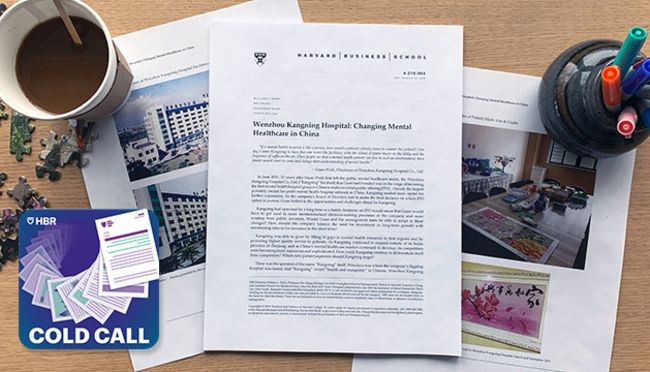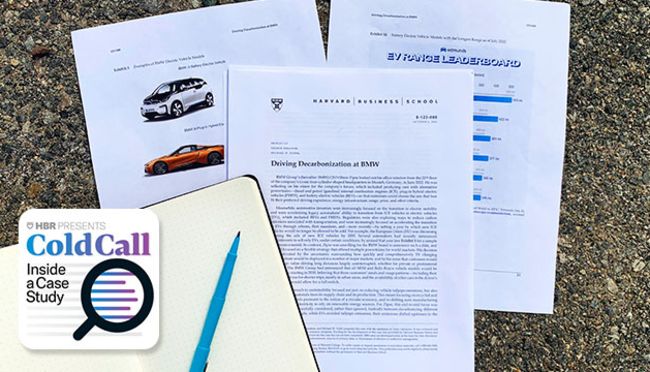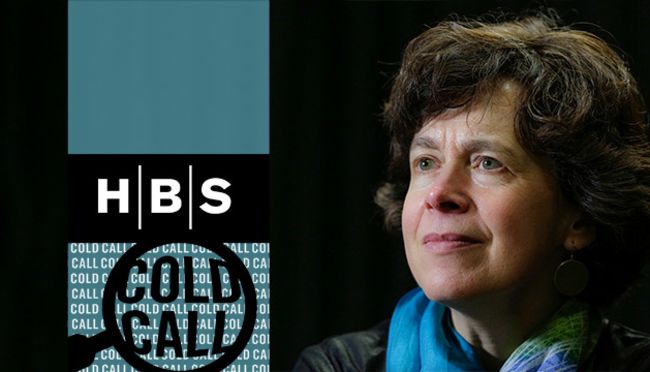Germany →
→

- 24 Jul 2023
- Research & Ideas
Part-Time Employees Want More Hours. Can Companies Tap This ‘Hidden’ Talent Pool?
Businesses need more staff and employees need more work, so what's standing in the way? A report by Joseph Fuller and colleagues shows how algorithms and inflexibility prevent companies from accessing valuable talent in a long-term shortage.

- 23 May 2023
- Cold Call Podcast
The Entrepreneurial Journey of China’s First Private Mental Health Hospital
The city of Wenzhou in southeastern China is home to the country’s largest privately owned mental health hospital group, the Wenzhou Kangning Hospital Co, Ltd. It’s an example of the extraordinary entrepreneurship happening in China’s healthcare space. But after its successful initial public offering (IPO), how will the hospital grow in the future? Harvard Professor of China Studies William C. Kirby highlights the challenges of China’s mental health sector and the means company founder Guan Weili employed to address them in his case, Wenzhou Kangning Hospital: Changing Mental Healthcare in China.

- 28 Mar 2023
- Cold Call Podcast
BMW’s Decarbonization Strategy: Sustainable for the Environment and the Bottom Line
In mid-2022, automakers, consumers, regulators, and investors were focusing on the transition from internal combustion engine (ICE) vehicles to electric vehicles (EV). While this would reduce tail-pipe emissions, it ignored the fact that the production of EVs—and especially their batteries—increases emissions in the supply chain. Many automakers were announcing deadlines by which they would stop selling ICE vehicles altogether, buoyed by investment analysts and favorable press. But BMW decided to focus on lifecycle emissions and pursued a flexible powertrain strategy by offering vehicles with several options: gasoline and diesel-fueled ICE, plug-in hybrid electric vehicles, and battery electric vehicles. That approach received a frostier reception in the stock market. Assistant Professor Shirley Lu discusses how BMW plans to convince stakeholders that its strategy is good for both the environment and the company’s financial performance in the case, “Driving Decarbonization at BMW.”

- 15 Aug 2022
- Book
University of the Future: Finding the Next World Leaders in Higher Ed
Which universities will step into the void as American colleges decline? In the book Empires of Ideas, William Kirby explores how the history of higher education in the US, China, and Germany might shape its future.

- 14 Jul 2020
- Research & Ideas
Restarting Under Uncertainty: Managerial Experiences from Around the World
A survey of 50 companies across countries and industries reveals business leaders are hard at work adapting to the COVID threat. Research by Raffaella Sadun and colleagues. Open for comment; 0 Comments.

- 23 Jun 2020
- Working Paper Summaries
Dignity, Inequality, and the Populist Backlash: Lessons from America and Europe for a Sustainable Globalization
COVID-19 has enhanced already existing fissures undermining some societies’ commitments to globalization. Governments and firms need to act decisively to make the models of capitalism in the United States and Europe more friendly to small- and medium-sized firms, more equal in opportunity, and more meritocratic.

- 19 Nov 2019
- Cold Call Podcast
Lessons from IBM in Nazi Germany
Geoffrey Jones discusses his case study, "Thomas J. Watson, IBM and Nazi Germany," exploring the options and responsibilities of multinationals with investments in politically reprehensible regimes. Open for comment; 0 Comments.

- 21 May 2018
- HBS Case
How Would You Price One of the World's Great Watches?
For companies with lots of innovation stuffed in their products, getting the price right is a crucial decision. Stefan Thomke discusses how watchmaker A. Lange & Söhne puts a price on its 173-year-old craftsmanship. Open for comment; 0 Comments.

- 16 May 2018
- Research & Ideas
How Companies Managed Risk (and Even Benefitted) in World War Internment Camps
Foreign businesses located in at-war countries are often victims of expropriation. Historian Valeria Giacomin explores how German businesses in the United Kingdom and India mitigated risk and even benefitted when their employees were placed in internment camps during the World Wars. Open for comment; 0 Comments.

- 07 Sep 2017
- Cold Call Podcast
Faber-Castell Doubles Down on the Pencil
Some products are just harder to innovate than others. The pencil, for instance. Yet, Faber-Castell has been turning them out for more than 200 years, adding improvements such as color and cosmetic products to the mix. In this podcast, Ryan Raffaelli discusses how older products can become young again. Open for comment; 0 Comments.

- 06 Apr 2017
- Cold Call Podcast
Why German Business Supports, Trains and Hires Syrian Refugees
Germany has been taking in more than a million Syrian refugees each year, and involves the business community in making them productive workers. Has it worked out as hoped? In this podcast, Rebecca Henderson discusses her case study on Germany's experience. Open for comment; 0 Comments.

- 06 Oct 2016
- Cold Call Podcast
The Munich Oktoberfest: From Local Tradition to Global Capitalism
Professor Juan Alcacer discusses how the Oktoberfest brand has been transplanted around the globe, whether copycat festivals help or hurt its reputation, and to what extent its original hosts could or should be profit-motivated. Open for comment; 0 Comments.

- 21 Jan 2016
- Working Paper Summaries
The Globalization of Angel Investments: Evidence across Countries
Examining a cross-section of 13 angel groups who considered transactions across 21 countries, this study finds that angel investors have a positive impact on the growth of the firms they fund, their performance, and survival, while the selection of firms that apply for angel funding varies across countries.
- 07 Oct 2015
- What Do You Think?
What is the Best Immigration Model for the US?
SUMMING UP: Does Europe have anything to teach the United States about integrating immigrants? James Heskett's readers add their opinions. Open for comment; 0 Comments.

- 15 May 2015
- Research & Ideas
Kids Benefit From Having a Working Mom
Women whose moms worked outside the home are more likely to have jobs themselves, are more likely to hold supervisory responsibility at those jobs, and earn higher wages than women whose mothers stayed home full time, according to research by Kathleen McGinn and colleagues. Open for comment; 0 Comments.
- 05 Sep 2006
- Research & Ideas
HBS Cases: Porsche’s Risky Roll on an SUV
Why would a company want to locate in a high-cost, high-wage economy like Germany? Porsche's unusual answer has framed two case studies by HBS professor Jeffrey Fear and colleague Carin-Isabel Knoop. Closed for comment; 0 Comments.

Could Clean Hydrogen Become Affordable at Scale by 2030?
The cost to produce hydrogen could approach the $1-per-kilogram target set by US regulators by 2030, helping this cleaner energy source compete with fossil fuels, says research by Gunther Glenk and colleagues. But planned global investments in hydrogen production would need to come to fruition to reach full potential.